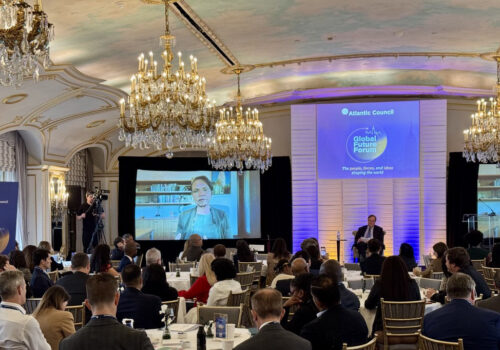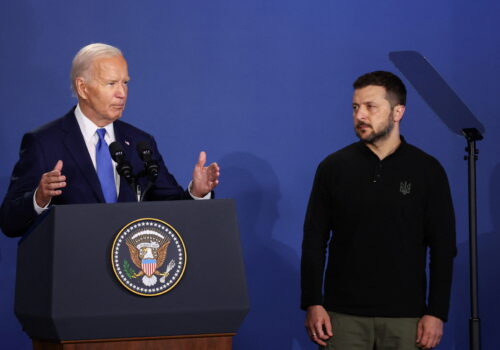Condoleezza Rice: ‘Do you want Russia and China to shape the international environment?’
“Whoever inhabits the White House in January needs to recognize that the United States doesn’t have a choice now but to be involved in the world and to try to shape the international environment,” former US Secretary of State Condoleezza Rice said Tuesday during an Atlantic Council Front Page event at the inaugural Global Future Forum.
“Great powers don’t mind their own business. So, the real question is: Do you want Russia and China to shape the international environment? Or do we want to shape the international environment with our allies?”
Rice’s discussion with Atlantic Council President and CEO Frederick Kempe covered a wide range of pressing global issues, from Russia’s war in Ukraine and China’s moves in the Indo-Pacific to the future of artificial intelligence (AI) and the stakes of the US presidential election in November.
The four horsemen ride again
- “It’s a complicated time. It’s a dangerous time. And I just hope that we in the United States can recognize it as such and not fall into a sense that we can simply leave the world to itself,” Rice said. Expanding on a recent essay in Foreign Affairs, Rice described what she sees as the perils of US isolationism.
- She identifies the impulse to turn away from the world as one of “four horsemen of the apocalypse,” along with populism, nativism, and protectionism. All four “seem to be riding again,” she explained.
- Yet history has shown the dangerous consequences of those impulses being given free rein. “Every time we have tried to withdraw, we’ve paid a price for it,” she said, noting early US hesitancy in World War I and World War II as examples.
‘Slam them together’
- One reason the current moment is so dangerous, Rice explained, is the return of great power conflict. We’re in a period in which conflict with Russia, China, and Iran is “actually territorial in its content,” with these authoritarians often seeking to expand their boundaries. Moreover, these powers are working together. “They are coordinating because they have one thing in common,” Rice said. “They want to see American power pushed out of these regions, and they want a different kind of international order.”
- This coordination has its limits, of course, but Rice pointed out that the World War II axis powers were not “all that friendly” and yet “made a lot of trouble.”
- While some US policymakers and commentators argue for trying to pull this rising axis of authoritarians apart, Rice calls for the opposite approach. “My view is slam them together, instead. Make them deal with the consequences of the fact that they don’t actually have all that much in common.”
Eye to eye with a two-speed Russian president
- “Vladimir Putin has kind of two speeds,” Rice said of the Russian president. One is to try to humiliate and the other is to try to intimidate, she said. “In a funny sort of way, we had a reasonably good relationship because he knew that I was a Russianist,” and thus would pay Moscow proper attention. But in Putin she identified a sense of “insecurity about Russia’s place in the world” that explains some of how he has ruled his country.
- Putin once told Rice that Russia has only been great when it has been ruled by great men, such as Alexander II and Peter the Great. This revealed to her that the Russian president thinks of himself in “a kind of messianic state,” she explained. “He’s a nationalist, and he wants to reestablish the Russian Empire. And you can’t have a Russian Empire if there’s an independent Ukraine.”
- Soon, Washington and Kyiv will need to start thinking about what constitutes a “prosperous, secure, united Ukraine.” Part of this will be deciding what exactly a US security guarantee to Ukraine will include. “I can think of a lot of countries that we have secured even if they didn’t have full territorial integrity,” she said, noting West Germany during the Cold War and South Korea today.
The problem is Beijing
- “The Indo-Pacific is a much more dangerous place, not because of American policy, but because of Chinese policy,” Rice said. And there’s one man she holds responsible: Chinese leader Xi Jinping has changed “the character of China’s interaction with the world,” choosing to double down on political control and dismissing further economic liberalization.
- The follow-on effects of Xi’s decision have harmed everything from technology development and supply chains to maritime security, Rice said. To anyone who asks how to improve the US-China relationship, she has this straightforward answer: “That has to start in Beijing.”
‘We saw what authoritarians do during COVID’
- Rice—who lives in Silicon Valley, where she leads the Hoover Institution at Stanford University—described herself as a “techno-optimist,” but she also acknowledged that AI and other new technologies pose dangers as well as opportunities.
- “I’m quite aware that human beings have tended to be way better at the knowledge part of technology than at the wisdom part. We need to come to a better understanding of how we promote the promise of these technologies while being cognizant of where this could go wrong.”
- The double-edged qualities of new technologies make it even more important for the United States to work with its allies and partners, she explained. Free and open nations must both win the global technological race and assess any potential risks in a transparent manner.
- The alternative, Rice said, is to cede the advantage to closed countries such as China. “We saw what authoritarians do during COVID. They hide the facts. They won’t answer questions, and so let’s make sure that we win this race.”
John Cookson is the New Atlanticist editor at the Atlantic Council.
Further reading
Tue, Sep 24, 2024
The United States must prove its willingness to remain engaged in the world, says Condoleezza Rice
Transcript By
Former US Secretary of State Condoleezza Rice spoke about the dangers of isolationism at the Global Future Forum.
Tue, Sep 17, 2024
Biden shouldn’t ‘throw away his shot’ at a foreign policy legacy. It starts with Ukraine.
Inflection Points By Frederick Kempe
Biden’s excessive caution on aiding Ukraine could squander his best chance at leaving behind a positive foreign policy legacy.
Wed, Sep 18, 2024
Dispatch from Kyiv: The Kursk offensive is working, but Ukrainians are worried about US wobbling
New Atlanticist By John E. Herbst
Morale in Kyiv has been boosted by the early success of the incursion into Kursk, but tempered by concerns over US support.
Image: Former US Secretary of State Condoleezza Rice gives her keynote speech during the unveiling ceremony for the Lugar Monument on Tuesday, September 3, 2024 in Bicentennial Unity Plaza. Photo via Reuters.


